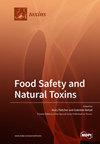Astaxanthin Alleviates Hepatic Lipid Metabolic Dysregulation Induced by Microcystin-LR
IF 3.9
3区 医学
Q2 FOOD SCIENCE & TECHNOLOGY
引用次数: 0
Abstract
Microcystin-LR (MC-LR), frequently generated by cyanobacteria, has been demonstrated to raise the likelihood of liver disease. Few previous studies have explored the potential antagonist against MC-LR. Astaxanthin (ASX) has been shown to possess various beneficial effects in regulating lipid metabolism in the liver. However, whether ASX could alleviate MC-LR-induced hepatic lipid metabolic dysregulation is as yet unclear. In this work, the important roles and mechanisms of ASX in countering MC-LR-induced liver damage and lipid metabolic dysregulation were explored for the first time. The findings revealed that ASX not only prevented weight loss but also enhanced liver health after MC-LR exposure. Moreover, ASX effectively decreased triglyceride, total cholesterol, aspartate transaminase, and alanine aminotransferase contents in mice that were elevated by MC-LR. Histological observation showed that ASX significantly alleviated lipid accumulation and inflammation induced by MC-LR. Mechanically, ASX could significantly diminish the expression of genes responsible for lipid generation (Srebp-1c, Fasn, Cd36, Scd1, Dgat1, and Pparg), which probably reduced lipid accumulation induced by MC-LR. Analogously, MC-LR increased intracellular lipid deposition in THLE-3 cells, while ASX decreased these symptoms by down-regulating the expression of key genes in the lipid synthesis pathway. Our results implied that ASX played a crucial part in lipid synthesis and effectively alleviated MC-LR-induced lipid metabolism dysregulation. ASX might be developed as a novel protectant against hepatic impairment and lipid metabolic dysregulation associated with MC-LR. This study offers new insights for further management of MC-LR-related metabolic diseases.虾青素缓解微囊藻毒素-LR 引起的肝脂代谢失调
蓝藻中经常产生的微囊藻毒素-LR(MC-LR)已被证实会增加肝病的发病几率。此前很少有研究探讨 MC-LR 的潜在拮抗剂。虾青素(ASX)已被证明在调节肝脏脂质代谢方面具有多种有益作用。然而,ASX能否缓解MC-LR诱导的肝脏脂质代谢失调尚不清楚。本研究首次探讨了 ASX 在对抗 MC-LR 诱导的肝损伤和脂质代谢失调中的重要作用和机制。研究结果表明,ASX不仅能防止体重下降,还能增强MC-LR暴露后的肝脏健康。此外,ASX 还能有效降低因 MC-LR 而升高的小鼠甘油三酯、总胆固醇、天门冬氨酸转氨酶和丙氨酸氨基转移酶的含量。组织学观察表明,ASX 能明显减轻 MC-LR 引起的脂质蓄积和炎症反应。从机理上讲,ASX能显著降低脂质生成基因(Srebp-1c、Fasn、Cd36、Scd1、Dgat1和Pparg)的表达,这可能减少了MC-LR诱导的脂质积累。同样,MC-LR 增加了 THLE-3 细胞的细胞内脂质沉积,而 ASX 则通过下调脂质合成途径中关键基因的表达减少了这些症状。我们的研究结果表明,ASX在脂质合成过程中起着关键作用,能有效缓解MC-LR诱导的脂质代谢失调。ASX 可作为一种新型保护剂,防止 MC-LR 引起的肝功能损害和脂质代谢失调。这项研究为进一步治疗与MC-LR相关的代谢性疾病提供了新的思路。
本文章由计算机程序翻译,如有差异,请以英文原文为准。
求助全文
约1分钟内获得全文
求助全文
来源期刊

Toxins
TOXICOLOGY-
CiteScore
7.50
自引率
16.70%
发文量
765
审稿时长
16.24 days
期刊介绍:
Toxins (ISSN 2072-6651) is an international, peer-reviewed open access journal which provides an advanced forum for studies related to toxins and toxinology. It publishes reviews, regular research papers and short communications. Our aim is to encourage scientists to publish their experimental and theoretical results in as much detail as possible. There is no restriction on the length of the papers. The full experimental details must be provided so that the results can be reproduced.
 求助内容:
求助内容: 应助结果提醒方式:
应助结果提醒方式:


